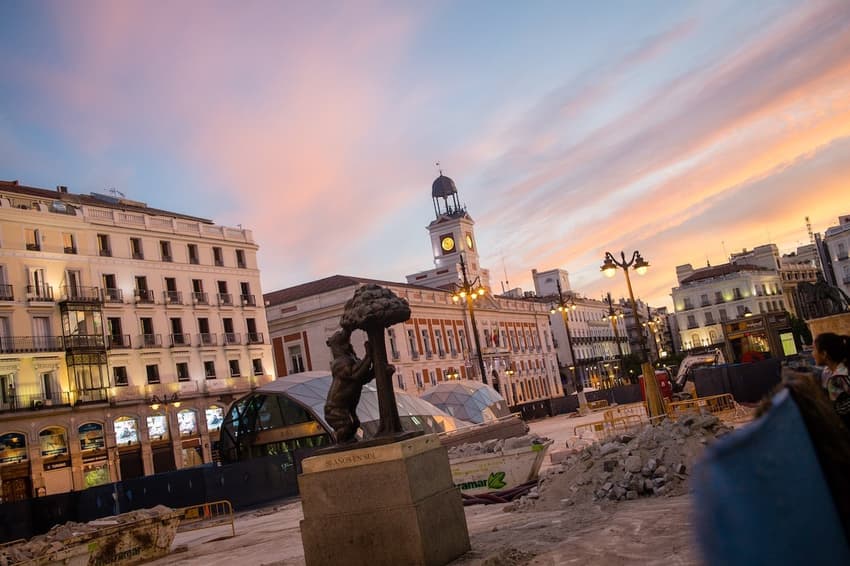How the fate of Madrid's trees hinges on voters

In Madrid, where summer temperatures are becoming increasingly unbearable due to climate change, the fate of the city's trees has become a hot-button topic ahead of Spain's local and regional elections.
On the eve of Sunday's vote, the right-wing Popular Party (PP), which governs both the capital and the Madrid region, has come under attack for its renovation of Puerta del Sol square without planting a single tree.
In a city whose emblem features a wild bear nuzzling a strawberry tree - a statue of which graces the square - critics say a major opportunity was missed to introduce vegetation to the sweeping plaza.
Faced with the backlash, city hall has paused controversial plans to fell more than 1,000 trees next to the Manzanares River to extend a metro line.
"All scientists say 'you must plant trees'... and add more greenery" to fight climate change, which is causing abnormal heat in Madrid, said Susana de la Higuera, spokeswoman for Pasillo Verde, the association behind the protests that have been key in halting the tree-felling plans.
"But Madrid's regional government is trying to destroy (the trees) here, and city hall is also involved," she told AFP.
READ ALSO: How to vote in person in Spain’s municipal elections
Experts say climate change is causing earlier and more intense heatwaves in Madrid and the rest of Spain.
Trees play an important role in countering the "urban heat island effect" that causes cities to be several degrees warmer than nearby rural areas.
The issue is particularly sensitive in Madrid which lost nearly 20 percent of its mature trees over the past four years, mostly due to the historic snowfall which blanketed the Spanish capital in January 2021, municipal figures show.
Javier Padilla, spokesman for the leftist Más Madrid, said city hall had "done nothing to replant the trees" after the storm, and also accused the region's hardline right-wing Isabel Díaz Ayuso of climate change denial.
READ ALSO: Madrid's Díaz Ayuso, a right-wing thorn in Spanish PM's side
She came under fire in November for saying measures to fight global warming were "a big scam" and claiming that the climate has been continuously changing "for as long as Earth has existed".
Meanwhile, Mayor José Luis Martínez-Almeida hit back at his left-wing critics by accusing them of a mass culling of the city's trees when they were in city hall between 2015 and 2019.
If re-elected on Sunday, he has pledged to plant 500,000 trees.
Comments
See Also
On the eve of Sunday's vote, the right-wing Popular Party (PP), which governs both the capital and the Madrid region, has come under attack for its renovation of Puerta del Sol square without planting a single tree.
In a city whose emblem features a wild bear nuzzling a strawberry tree - a statue of which graces the square - critics say a major opportunity was missed to introduce vegetation to the sweeping plaza.
Faced with the backlash, city hall has paused controversial plans to fell more than 1,000 trees next to the Manzanares River to extend a metro line.
"All scientists say 'you must plant trees'... and add more greenery" to fight climate change, which is causing abnormal heat in Madrid, said Susana de la Higuera, spokeswoman for Pasillo Verde, the association behind the protests that have been key in halting the tree-felling plans.
"But Madrid's regional government is trying to destroy (the trees) here, and city hall is also involved," she told AFP.
READ ALSO: How to vote in person in Spain’s municipal elections
Experts say climate change is causing earlier and more intense heatwaves in Madrid and the rest of Spain.
Trees play an important role in countering the "urban heat island effect" that causes cities to be several degrees warmer than nearby rural areas.
The issue is particularly sensitive in Madrid which lost nearly 20 percent of its mature trees over the past four years, mostly due to the historic snowfall which blanketed the Spanish capital in January 2021, municipal figures show.
Javier Padilla, spokesman for the leftist Más Madrid, said city hall had "done nothing to replant the trees" after the storm, and also accused the region's hardline right-wing Isabel Díaz Ayuso of climate change denial.
READ ALSO: Madrid's Díaz Ayuso, a right-wing thorn in Spanish PM's side
She came under fire in November for saying measures to fight global warming were "a big scam" and claiming that the climate has been continuously changing "for as long as Earth has existed".
Meanwhile, Mayor José Luis Martínez-Almeida hit back at his left-wing critics by accusing them of a mass culling of the city's trees when they were in city hall between 2015 and 2019.
If re-elected on Sunday, he has pledged to plant 500,000 trees.
Join the conversation in our comments section below. Share your own views and experience and if you have a question or suggestion for our journalists then email us at [email protected].
Please keep comments civil, constructive and on topic – and make sure to read our terms of use before getting involved.
Please log in here to leave a comment.